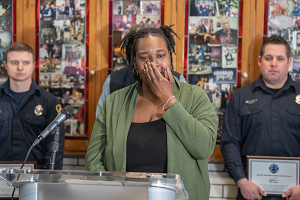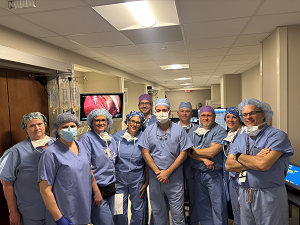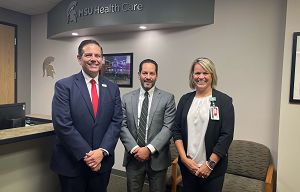Henry Ford Study: High Mortality Associated with Acute Kidney Injury

DETROIT (February 10, 2022) – One in four patients who developed a serious complication called acute kidney injury (AKI) in the hospital will die within one year, heightening the urgency for new treatment options to improve patients’ survival, according to a Henry Ford Health System study.
The study, published this month in the Clinical Journal of the American Society of Nephrology, is the first to examine AKI associated mortality after one year using standard lab-based criteria instead of hospital billing codes, said Ryann Sohaney, D.O., a Henry Ford nephrologist and the study’s lead author.
In an accompanying Editorial in CJASN, the authors cite the important findings of the study and advocate for identifying new therapies to improve patient outcomes.
“We’ve not made any progress on long-term outcomes after acute kidney injury,” Dr. Sohaney said. “It’s one of the most common kidney conditions. In fact, mortality associated with severe AKI is even higher than individuals with end-state kidney disease.”
Acute kidney injury, also known as acute renal failure, is a common complication in patients who are hospitalized or in the intensive care unit. It develops when the kidneys are unable to filter waste products from the blood and abruptly stop working.
Diabetes, hypertension, and advanced age are primary risk factors for AKI, according to the National Kidney Foundation. AKI is associated with in-hospital complications of sepsis, heart conditions, and surgery.
The retrospective study examined data from the Veterans Health Administration of more than 1.6 million U.S. Veterans hospitalized between Oct. 1, 2008 and Sept. 31, 2017. It’s the only data base of national scope that allows for ascertaining AKI according to laboratory values, Dr. Sohaney said.
Key findings of the study:
- Six percent of patients with AKI died in the hospital.
- 28 percent of patients with AKI died within one year of their admission.
“Our findings point to an urgent need to focus on interventions post hospitalization to improve the long-term outcomes for these patients,” Dr. Sohaney said.
The study involved researchers from Henry Ford, University of Michigan and University of California-San Francisco. It was funded by the Centers for Disease Control and Prevention.
###
NEWS MEDIA ONLY may contact: David Olejarz / David.Olejarz@hfhs.org / 313-303-0606
.svg?iar=0&hash=F6049510E33E4E6D8196C26CCC0A64A4)

/hfh-logo-main--white.svg?iar=0&hash=ED491CBFADFB7670FAE94559C98D7798)








